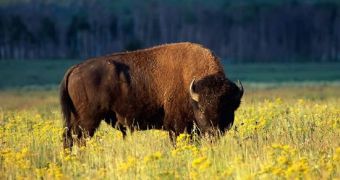A team of researchers writing in a recent issue of the scientific journal PLOS ONE detail how, because of the new weather patterns brought about by climate change and global warming, both bison and other grazing animals presently inhabiting the Great Plains have started to shrink.
Researcher Joseph Craine with the Kansas State University explains that, all things considered, bison and other such animals born over the course of the next 50 years will be significantly smaller than past generations.
He and his colleagues maintain that this will happen because the grass these animals rely on in order to develop and grow will get less nutritious as the years go by.
“We know that temperatures are going to go up. We also know that warmer grasslands have grasses with less protein, and we now know that warmer grasslands have smaller grazers,” Joseph Craine argued.
“It all lines up to suggest that climate change will cause grasses to have less protein and cause grazers to gain less weight in the future,” he went on to say.
As explained on the official website for the Kansas State University, these assumptions are backed up by data collected while monitoring a total of 22 bison herds spread across the entire territory of the United States.
Thus, bison living in slightly warmer regions were found to weigh less than those inhabiting cooler ones.
The specialists say that this was because the grass they fed on contained fewer nutrients.
Both Joseph Craine and his fellow researchers fear that, as bison and other grazing animals begin to shrink because of climate change, both local biodiversity and local economy will be affected.
“Bison are one of our most important conservation animals and hold a unique role in grasslands in North America.”
“In addition to their cultural and ecological significance, they're economically important both from a livestock perspective and from a tourism perspective,” Joseph Craine wished to stress.

 14 DAY TRIAL //
14 DAY TRIAL //